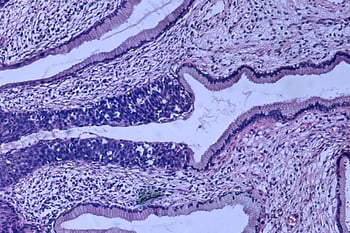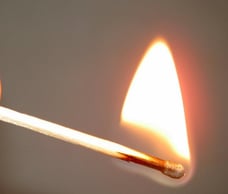 Clouds are formed when tiny drops of water collect around a central particle (nuclei) like dust or microbial life, but not all particles are able to absorb the necessary water to form a cloud, leaving many holes in the knowledge of cloud formation.
Clouds are formed when tiny drops of water collect around a central particle (nuclei) like dust or microbial life, but not all particles are able to absorb the necessary water to form a cloud, leaving many holes in the knowledge of cloud formation.
Tags: Midwest, WI, University of Wisconsin Madison, UWisc, 2015, BioResearch Product Faire Event, Madison, Clouds, Ocean, Cloud formation
 Cervical cancer is the third leading cause of cancer deaths for women worldwide, with more than 500,000 new cases per year. In the United States, however, early screening and HPV vaccine have resulted in a decline in U.S. rates to approximately 12,000 cases annually.
Cervical cancer is the third leading cause of cancer deaths for women worldwide, with more than 500,000 new cases per year. In the United States, however, early screening and HPV vaccine have resulted in a decline in U.S. rates to approximately 12,000 cases annually.
Tags: University of Wisconsin Madison Research Park, cancer research, Wisconsin, UWiscRP, UWisc, Cancer, UW Madison, 2015, BioResearch Product Faire Front Line Event, BioResearch Product Faire Event, Madison
 The Deepwater Horizon Oil Spill that occurred in the Gulf of Mexico in 2010 spilled 4.9 million barrels of oil into the Gulf, causing tremendous impacts to the ecosystem. The Exxon Valdez Oil Spill in the Prince William Sound in 1989 also had a tremendous impact on the environment. Impacts of these spills can still be seen, and there is still oil that has not yet been cleaned up on land and in the water. (Image courtesy of Pete Markham via Wikimedia Commons)
The Deepwater Horizon Oil Spill that occurred in the Gulf of Mexico in 2010 spilled 4.9 million barrels of oil into the Gulf, causing tremendous impacts to the ecosystem. The Exxon Valdez Oil Spill in the Prince William Sound in 1989 also had a tremendous impact on the environment. Impacts of these spills can still be seen, and there is still oil that has not yet been cleaned up on land and in the water. (Image courtesy of Pete Markham via Wikimedia Commons)
Tags: Midwest, WI, University of Wisconsin Madison, UWisc, 2015, BioResearch Product Faire Event, Madison, Materials Research, Oil Spill Cleanup
In an effort to avoid abusing antibiotics, more and more researchers have been looking for alternate ways to kill or otherwise inhibit pathogens. We have seen several excellent and creative examples here in the Science Market Update, for instance exploding bacteria from the inside or even just telling bacteria not to infect us. Now a research group at The University of Wisconsin, Madison have devised a clever way to vaccinate farm animals to protect them from common troubling diseases.
Read MoreTags: WI, University of Wisconsin Madison, UWisc, 2015, BioResearch Product Faire Event, Madison
 When people become severely burned, there are limited options available to repair the skin and tissue that have been affected. People must undergo painful and tedious surgery and skin transplants to repair the damaged skin and tissues. Stratatech Corp., a Madison, WI based company, has been focused on creating new treatment options for severe burns and recently developed new human skin tissue called StrataGraft that was used to heal severe burn wounds in 30 patients during a recent clinical trial. (Image courtesy of Heidas via Wikimedia Commons).
When people become severely burned, there are limited options available to repair the skin and tissue that have been affected. People must undergo painful and tedious surgery and skin transplants to repair the damaged skin and tissues. Stratatech Corp., a Madison, WI based company, has been focused on creating new treatment options for severe burns and recently developed new human skin tissue called StrataGraft that was used to heal severe burn wounds in 30 patients during a recent clinical trial. (Image courtesy of Heidas via Wikimedia Commons).
Tags: Midwest, University of Wisconsin Madison Research Park, WI, university research park, UWiscRP, 2015, BioResearch Product Faire Front Line Event, Madison, StrataGraft, Stratatech
With the support of a recently awarded $2.3 million NIH New Innovator Award, Pamela Kreeger from the University of Wisconsin, Madison will continue her research into what causes ovarian cancer in women to spread. Pamela Kreeger was one of 50 researchers to receive the prestigious New Innovator Award from the National Institutes of Health in 2014.
Read MoreTags: Midwest, Bioresearch, WI, University of Wisconsin Madison, UWisc, 2015, BioResearch Product Faire Event, Madison, NIH funding, ovarian cancer
A team of researchers at the University of Wisconsin School of Medicine and Public Health in Madison have discovered a way to loosen the foothold of Rhinovirus C (RV-C) in the human body. RV-C is among the most common viral infections in humans and is also the leading cause of the common cold. We haven’t been able to do much to change that so far, but the UW work presents a new understanding and method of attacking the virus.
Read MoreTags: Wisconsin, University of Wisconsin Madison, UWisc, 2015, BioResearch Product Faire Event, Madison
 One common trait that all humans and animals share is the need for sleep. Even though sleep is a necessity for humans and animals to properly function, there are many disorders that interfere with sleep, such as insomnia and night terrors. Another disorder that certain animals experience is called "local sleep" where part of the brain sleeps while the animal is still awake. Two big questions researchers have are why this happens, and if it can also occur in humans. (Image courtesy of Wikimedia Commons).
One common trait that all humans and animals share is the need for sleep. Even though sleep is a necessity for humans and animals to properly function, there are many disorders that interfere with sleep, such as insomnia and night terrors. Another disorder that certain animals experience is called "local sleep" where part of the brain sleeps while the animal is still awake. Two big questions researchers have are why this happens, and if it can also occur in humans. (Image courtesy of Wikimedia Commons).
Tags: Midwest, WI, University of Wisconsin Madison, UWisc, 2015, BioResearch Product Faire Event, Madison, research grant, Sleep
 The prostate can cause problems for many men as they age, and some of these problems do not yet have solid treatments that can help with the problems. With the help of a recent $8.3 million grant from the National Institutes of Health (NIH) in late 2014, the University of Wisconsin, Madison will be able to establish a new Urology Research Center that will focus on studying the prostate and some common diseases associated with it.
The prostate can cause problems for many men as they age, and some of these problems do not yet have solid treatments that can help with the problems. With the help of a recent $8.3 million grant from the National Institutes of Health (NIH) in late 2014, the University of Wisconsin, Madison will be able to establish a new Urology Research Center that will focus on studying the prostate and some common diseases associated with it.
Tags: Midwest, WI, University of Wisconsin Madison, UWisc, 2015, BioResearch Product Faire Event, Madison, New research center, Urology
In biotechnology, one man’s trash is very often another man’s treasure. We’ve seen prime examples of this with the chlorine-eating bacteria developed at the University of Minnesota and the anaerobic digester at MSU which produces renewable energy from the biowaste of the campus. Now a consortium spearheaded by the University of Wisconsin-Madison is working on turning the problem of dairy farm manure into solutions to other problems.
Read More
Tags: Wisconsin, University of Wisconsin Madison, UWisc, 2015, BioResearch Product Faire Event, Madison

